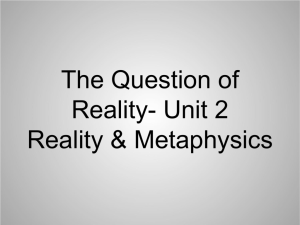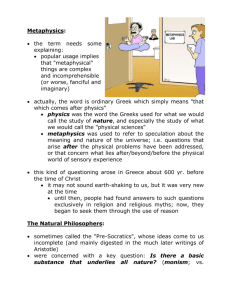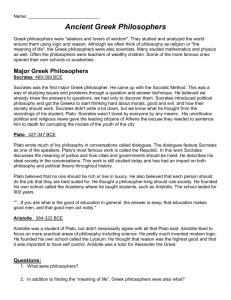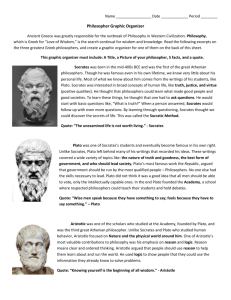Major Greek Philosophers Before the Hellenistic Period Pre
advertisement
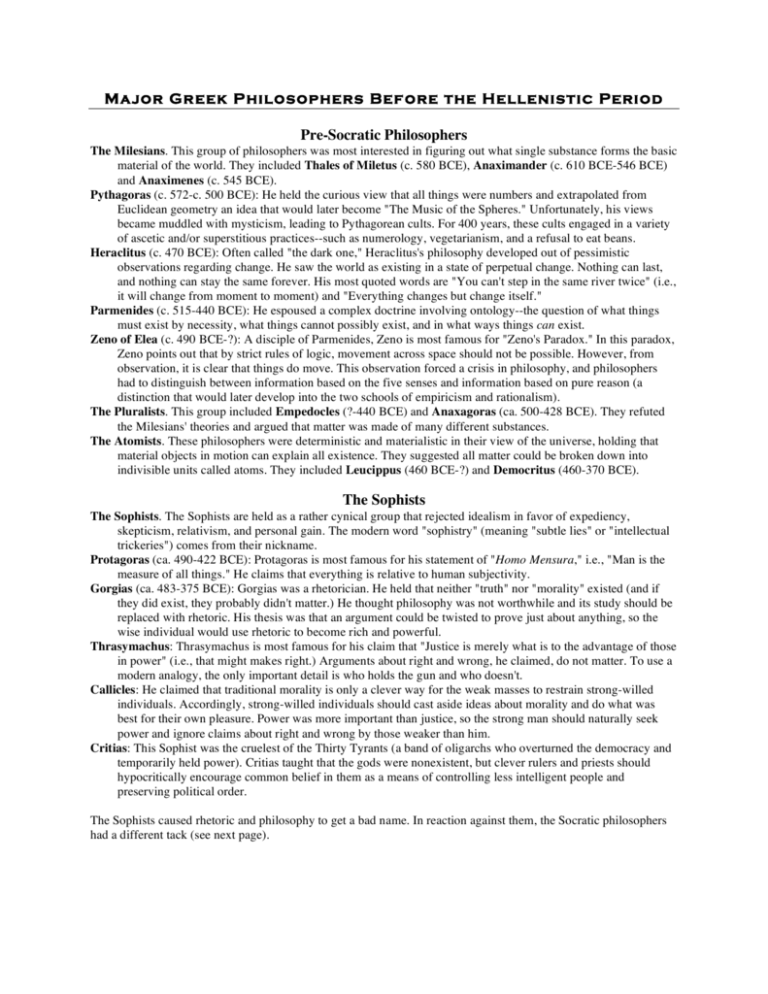
Major Greek Philosophers Bef ore the Hellenistic Period Pre-Socratic Philosophers The Milesians. This group of philosophers was most interested in figuring out what single substance forms the basic material of the world. They included Thales of Miletus (c. 580 BCE), Anaximander (c. 610 BCE-546 BCE) and Anaximenes (c. 545 BCE). Pythagoras (c. 572-c. 500 BCE): He held the curious view that all things were numbers and extrapolated from Euclidean geometry an idea that would later become "The Music of the Spheres." Unfortunately, his views became muddled with mysticism, leading to Pythagorean cults. For 400 years, these cults engaged in a variety of ascetic and/or superstitious practices--such as numerology, vegetarianism, and a refusal to eat beans. Heraclitus (c. 470 BCE): Often called "the dark one," Heraclitus's philosophy developed out of pessimistic observations regarding change. He saw the world as existing in a state of perpetual change. Nothing can last, and nothing can stay the same forever. His most quoted words are "You can't step in the same river twice" (i.e., it will change from moment to moment) and "Everything changes but change itself." Parmenides (c. 515-440 BCE): He espoused a complex doctrine involving ontology--the question of what things must exist by necessity, what things cannot possibly exist, and in what ways things can exist. Zeno of Elea (c. 490 BCE-?): A disciple of Parmenides, Zeno is most famous for "Zeno's Paradox." In this paradox, Zeno points out that by strict rules of logic, movement across space should not be possible. However, from observation, it is clear that things do move. This observation forced a crisis in philosophy, and philosophers had to distinguish between information based on the five senses and information based on pure reason (a distinction that would later develop into the two schools of empiricism and rationalism). The Pluralists. This group included Empedocles (?-440 BCE) and Anaxagoras (ca. 500-428 BCE). They refuted the Milesians' theories and argued that matter was made of many different substances. The Atomists. These philosophers were deterministic and materialistic in their view of the universe, holding that material objects in motion can explain all existence. They suggested all matter could be broken down into indivisible units called atoms. They included Leucippus (460 BCE-?) and Democritus (460-370 BCE). The Sophists The Sophists. The Sophists are held as a rather cynical group that rejected idealism in favor of expediency, skepticism, relativism, and personal gain. The modern word "sophistry" (meaning "subtle lies" or "intellectual trickeries") comes from their nickname. Protagoras (ca. 490-422 BCE): Protagoras is most famous for his statement of "Homo Mensura," i.e., "Man is the measure of all things." He claims that everything is relative to human subjectivity. Gorgias (ca. 483-375 BCE): Gorgias was a rhetorician. He held that neither "truth" nor "morality" existed (and if they did exist, they probably didn't matter.) He thought philosophy was not worthwhile and its study should be replaced with rhetoric. His thesis was that an argument could be twisted to prove just about anything, so the wise individual would use rhetoric to become rich and powerful. Thrasymachus: Thrasymachus is most famous for his claim that "Justice is merely what is to the advantage of those in power" (i.e., that might makes right.) Arguments about right and wrong, he claimed, do not matter. To use a modern analogy, the only important detail is who holds the gun and who doesn't. Callicles: He claimed that traditional morality is only a clever way for the weak masses to restrain strong-willed individuals. Accordingly, strong-willed individuals should cast aside ideas about morality and do what was best for their own pleasure. Power was more important than justice, so the strong man should naturally seek power and ignore claims about right and wrong by those weaker than him. Critias: This Sophist was the cruelest of the Thirty Tyrants (a band of oligarchs who overturned the democracy and temporarily held power). Critias taught that the gods were nonexistent, but clever rulers and priests should hypocritically encourage common belief in them as a means of controlling less intelligent people and preserving political order. The Sophists caused rhetoric and philosophy to get a bad name. In reaction against them, the Socratic philosophers had a different tack (see next page). The Socratic Philosophers The Socratic Philosophers were deeply offended by the Sophists and deeply suspicious of rhetoric. Their arguments with the Sophists appear in several writings such as The Symposium. The big three Socratic philosophers included the following: Socrates: Socrates is famous for his claim that he didn't know anything. According to the Oracle at Delphi, this claim proved Socrates was the wisest thinker in Athens. Socrates wrote no books, but his student Plato recorded his conversations. The typical Socratic dialogue had three divisions. (1) In the first section, Socrates would pose a problem, such as "What is virtue?" or "What is justice?" He would ask strangers about it, and he would become excited when they claimed to know the answer. (2) In the second section, Socrates would find "minor flaws" in his companions' definitions and begin to unravel them, forcing his partners to admit their ignorance. In one dialogue, in fact, the target is so shaken up he ends in tears. (3) Socrates and the other conversationalists agree to pursue the truth seriously and further refine their definitions. The dialogues almost all end inconclusively. Socrates' most famous quotation, as recorded in Plato, proclaims "the unexamined life is not worth living." Unfortunately his tendency to question established beliefs in the government and in religion created many enemies--especially since he encouraged young people to do the same. He was eventually put on trial for "corruption of the youth," and condemned to die by drinking hemlock. Many modern people hold up Socrates as a martyr for the truth. Plato (427-347 BCE): Socrates' favorite student, Plato, founded the Academy as a place for philosophers to teach. He recorded all of Socrates' dialogues he could remember. It's hard to say where Socrates' ideas end and Plato's ideas begin, but generally Plato's philosophy is more systematic and more mystical than Socrates' ideas. Plato's philosophy basically suggested that the world of true ideas (Justice, Beauty, Goodness, Virtue, Numbers, Geometry) had a reality of its own beyond the physical world. In a way, these concepts were even more real than the physical world of the senses. Physical reality was at best a shadow or dim outline of these abstract concepts, and at worst it was a distraction or lie that removes our attention from more important spiritual truths. This doctrine led Plato to some interesting conclusions. It logically followed that paintings, sculptures, drama, and literature were even further removed from reality, since they were merely false images of the already false physical world. This is why Plato suggests a perfect society (such as the one he postulates in The Republic) would banish artists, musicians, and writers and set up philosophers as kings. Aristotle: Aristotle spent twenty years at Plato's Academy, but he later left and founded his own school, the Lyceum. He taught Platonic philosophy to his students, but he also criticized it. He rejected Plato's dualism (the way Plato separated the world of ideas or forms from the physical world). He argued that some perfect, unchanging force or entity (a Prime Mover) outside of causality must have initiated the sequence of cause and effect in the material world, and he suggested that things in the material world are teleological (goal-oriented or purpose-oriented) in nature. Aristotle almost single-handedly founded symbolic binary logic and he wrote a series of important works on rhetoric, ethics, philosophy, art, drama, and poetry. If Plato was a "lumper" who tended to see similarities and generalize from these points to reach a greater truth, Aristotle was a "splitter" who tended to break subjects down into subdivisions to reach a greater truth.

